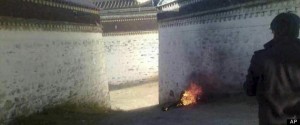 Despite a pivotal leadership shift last November inside the Chinese Communist Party, Tibetan demonstrators continue to protest Chinese rule in their region. New laws issued this week have strengthened the government’s grip on the area, where nearly 100 Tibetan monks, nuns and lay people have set themselves on fire since 2009. Qinghai Province, where most of the immolations took place, stepped up measures to identify and arrest those who have assisted suicides. Seven individuals this week alone were arrested for aiding an October death, though the individuals says the claims against them are “baseless”. The Dalai Lama has been the target of many attacks from the Chinese government over the issue. A professor in Chinese politics at the University of Hong Kong told the Associated Press, “I think the Chinese believe that time is on their side … after the death of the Dalai Lama, there won’t be such a powerful spiritual leader soliciting international support.” While time may be on their side, the government this week made more arrests and seized TV’s from citizens. The aim of their actions reflect an attempt to control the flow of information in and out of the region. As long as Tibetans seek more autonomy, however, large shifts in policy are not expected out of new officials. A scholar and activist for minority rights, Wang Lixiong, calls the tension “a boiler sitting on a fire with its vents blocked. The pressure inside is increasing constantly, the ultimate ending will be explosive.”
Despite a pivotal leadership shift last November inside the Chinese Communist Party, Tibetan demonstrators continue to protest Chinese rule in their region. New laws issued this week have strengthened the government’s grip on the area, where nearly 100 Tibetan monks, nuns and lay people have set themselves on fire since 2009. Qinghai Province, where most of the immolations took place, stepped up measures to identify and arrest those who have assisted suicides. Seven individuals this week alone were arrested for aiding an October death, though the individuals says the claims against them are “baseless”. The Dalai Lama has been the target of many attacks from the Chinese government over the issue. A professor in Chinese politics at the University of Hong Kong told the Associated Press, “I think the Chinese believe that time is on their side … after the death of the Dalai Lama, there won’t be such a powerful spiritual leader soliciting international support.” While time may be on their side, the government this week made more arrests and seized TV’s from citizens. The aim of their actions reflect an attempt to control the flow of information in and out of the region. As long as Tibetans seek more autonomy, however, large shifts in policy are not expected out of new officials. A scholar and activist for minority rights, Wang Lixiong, calls the tension “a boiler sitting on a fire with its vents blocked. The pressure inside is increasing constantly, the ultimate ending will be explosive.”
The Chinese seem to have forgotten that carrots can be more effective than sticks. But why would they forget this? It is a politics and not an economics question, but what are the incentives for ambitious officials in choosing between repression and cooptation?
Tibet seems to be more about China asserting its power and pride than any possible economic output the region produces. The Dalai Lama’s death will pose a very interesting question for China and Tibet in the future. Meanwhile ambitious officials appear to be following the book as opposed to allowing any sort of loosened policy within the region.
While I was aware of Tibetan monks setting themselves on fire for this cause, I was unaware that the numbers were so high. 100 people on fire since 2009 is absurd! I believe this issue should be settled sooner rather than later so more people don’t set themselves on fire, which looks unlikely with the recent actions by the Chinese government mentioned in this article.